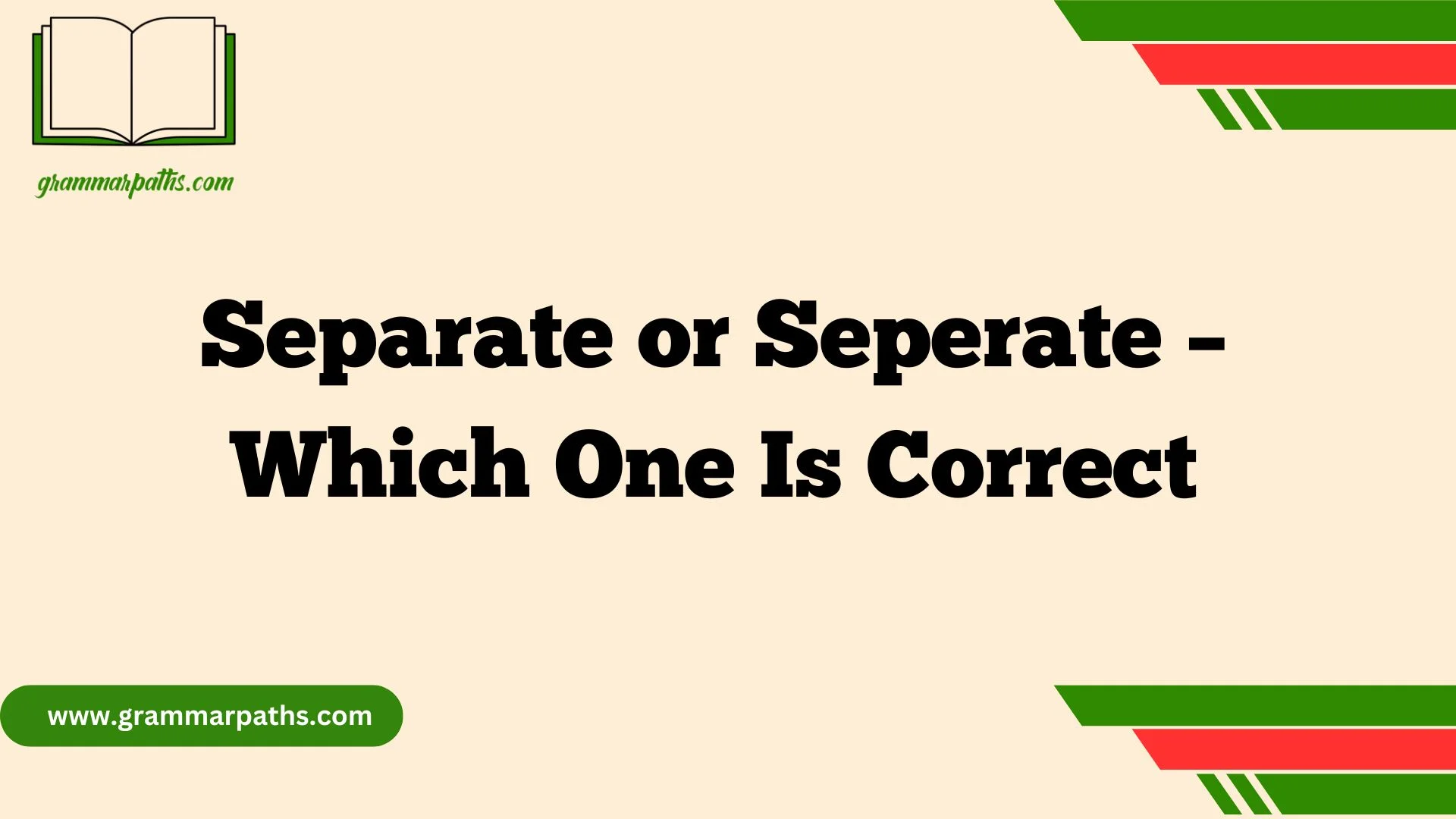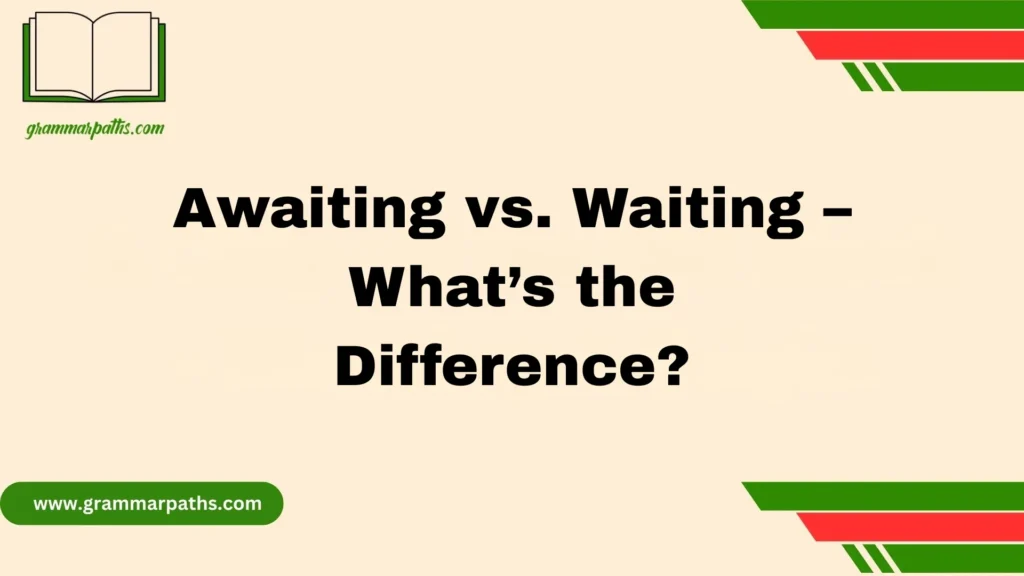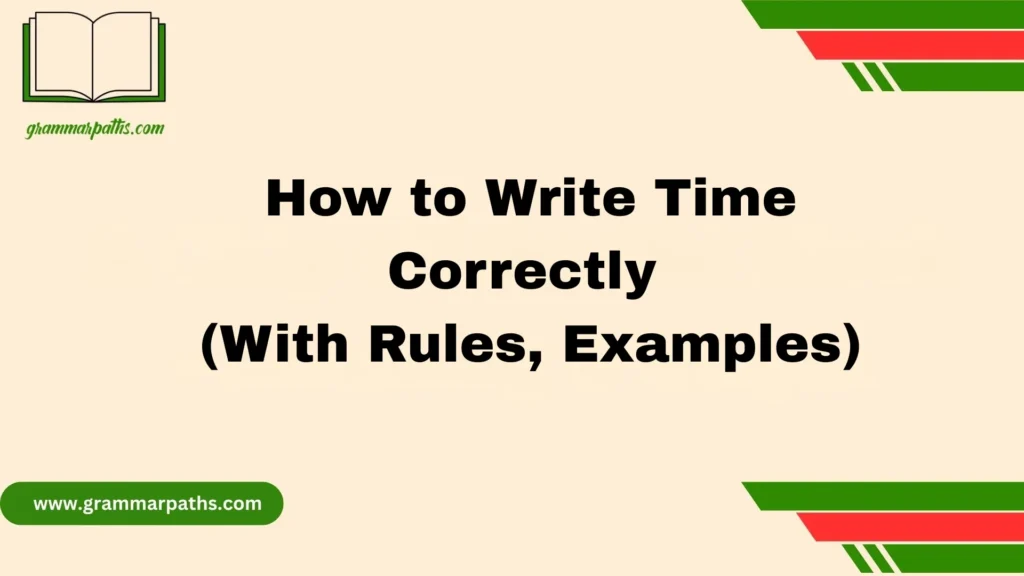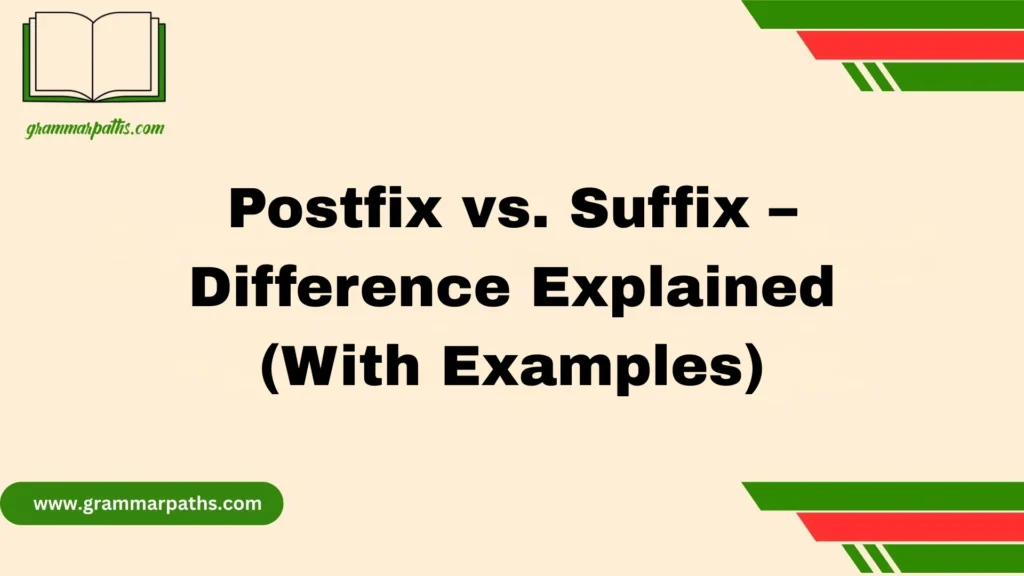Many people ask, “Separate or Seperate – which is correct?” The right spelling is “separate,” but it’s one of the most commonly misspelled words in English. Why? Because the pronunciation often sounds like it has an “e” in the middle. That’s why people search for tricks like, “Is there a way to remember how to spell separate?” Yes—just remember: “There’s a rat in separate.”
So, is “seperate” a real word? No—“seperate” is always incorrect, even though autocorrect might miss it. Whether you’re using “separate” as a verb (“Please separate the files”) or an adjective (“They have separate rooms”), the spelling stays the same. This word shows up in everything from grammar guides to proofreading checklists, so getting it right helps your writing look professional and polished. Don’t let spelling mistakes seperate you from credibility!
Why So Many People Get It Wrong
There are a few reasons why “separate” gets misspelled so often:
- The pronunciation doesn’t clearly hint at how it’s spelled.
- The second syllable sounds like it could use an “e” instead of an “a”.
- Many people type it out quickly and trust spellcheck (which doesn’t always help).
The Simple Truth: “Separate” is Right, “Seperate” is Wrong
Here’s the quick breakdown:
Separate = Correct
Seperate = Incorrect
There’s no version of English—American, British, or otherwise—where “seperate” is an acceptable spelling.
It doesn’t matter if you’re writing a text, essay, job application, or email. If you write “seperate,” you’re making a spelling mistake.
Where Does “Separate” Come From?
The word comes from the Latin word “separatus,” which means “to divide” or “set apart.” That’s why the word has an “a” in the middle, even if it doesn’t sound like it when spoken.
It passed through Old French (“separer”) and eventually made its way into Middle English.
Understanding the Latin root can help you remember that the correct version always includes an ‘a’—just like in the original.
How to Use “Separate” the Right Way
As a Verb
“Separate” is commonly used as a verb to mean to divide or set apart.
Examples:
- We need to separate the recyclables from the trash.
- Please separate your work files from personal ones.
Useful phrases:
- Separate out – to isolate or sort something from a group.
Example: “She separated out the blue shirts from the rest.”
As an Adjective
“Separate” can also describe things that are distinct or not connected.
Examples:
- They have separate bedrooms.
- The kitchen and dining area are in separate rooms.
In both uses, the meaning is always about division or distinction.
Rare Use as a Noun
Although rare, “separate” can also be a noun referring to a piece of clothing not part of a set.
Example:
- She packed two separates instead of a full suit.
“Seperate” Is Never Correct—Here’s Why
“Seperate” is not a valid spelling in any context. It’s not accepted in dictionaries, academic writing, or business communication.
Here’s what happens when you use the wrong spelling:
- Your writing looks careless.
- You lose credibility—especially in formal settings.
- Spell-check might not catch it if it’s repeated.
Let’s look at the comparison:
| Spelling | Is it Correct? | Notes |
| Separate | Yes | The only correct version |
| Seperate | No | Common error, not acceptable |
Easy Tricks to Remember “Separate”
1. There’s a rat in separate
This is the most popular trick. Just remember that the word hides “a rat” in the middle.
Se-pa- + rat + -e
2. Visual breakdown
Picture the word in chunks: sep – a – rat – e
Seeing it like that helps reinforce the correct sequence.
3. Say it slowly
Try saying the word out loud slowly: SEP-uh-rayt. That helps your brain lock in the “a.”
4. Use it in a sentence daily
Practice makes perfect. Use the word “separate” in your journal, to-do list, or notes.
Pronunciation: Why It’s Confusing
Here’s why the pronunciation tricks so many people:
| Use | Pronunciation | How it Sounds |
| As a verb | SEP-uh-rayt | Emphasis on “rayt” |
| As adjective | SEP-uh-rit | Softer final syllable |
That soft “uh” sound can trick your brain into thinking the middle letter is an “e”—but it’s not!
Examples in Real Sentences
Let’s see “separate” in action—versus the incorrect spelling:
| Context | Correct | Incorrect |
| Please send in separate files. | Please send in seperate files. | |
| School essay | Keep each idea separate. | Keep each idea seperate. |
| Instructions | Use separate tools for baking. | Use seperate tools for baking. |
As you can see, the difference matters!
Why Spelling “Separate” Correctly Is Important
1. Credibility
Your readers judge your writing. Misspelling such a common word looks careless—especially in a professional or academic setting.
2. Professionalism
In emails, resumes, cover letters, or websites, poor spelling sends the wrong message.
Quote:
“Correct spelling is part of clear communication. Get it right, and you’ll be taken seriously.” — Grammarist.com
3. Clarity
Incorrect spelling can lead to misunderstandings, especially for non-native readers.
Synonyms for “Separate” and How to Use Them
If you want to mix up your language, try using these words depending on the context:
| Synonym | Use case | Example |
| Divide | To split into parts | Divide the tasks among the team. |
| Isolate | To set apart | Isolate the subject for study. |
| Detach | To remove | Detach the charger from the wall. |
| Distinct | Different or unique | Each project has distinct goals. |
| Discrete | Separate and unconnected | The data is stored in discrete units. |
These words don’t replace “separate” in every case, so be sure to use the right one for your context.
Tips and Tools to Help You Get It Right Every Time
Online Tools
- Grammarly: Highlights spelling errors in real time.
- Hemingway Editor: Great for proofreading.
- Microsoft Word/Google Docs: Built-in spellcheck features.
Personal Techniques
- Create flashcards with the word and a sentence.
- Use writing apps like Notion or Evernote to practice.
- Say the word out loud as you write it.
- Check your drafts manually before sending or submitting.
FQAs:
1. Which is correct, separate or seperate?
“Separate” is the correct spelling. “Seperate” is a common misspelling and not accepted in standard English.
2. Does “separate” have two meanings?
Yes! “Separate” can be used as a verb (to divide) or an adjective (distinct or not connected). For example: “Please separate the papers” (verb), “They have separate rooms” (adjective).
3. Why is it separate and not seperate?
The correct spelling is “separate” because it comes from the Latin root separatus, meaning “to divide.” Though it sounds like it has an “e” in the middle, the right vowel is “a.”
4. What is the difference between separate and separated?
“Separate” is present tense or an adjective, while “separated” is the past tense of the verb. Example: “We separate items now,” vs. “We were separated last year.”
5. Is it separately or separately?
The correct adverb form is “separately.” Spelling it as “seperately” is incorrect and often flagged in writing tools.
6. Why do couples separate?
Couples often separate due to communication issues, conflicts, or personal differences. It may be temporary or permanent, depending on the situation and the relationship.
Final Thoughts: Master the Word “Separate” Once and for All
In conclusion, the correct spelling is always “separate,” not “seperate.” While it’s a common spelling mistake, understanding the reason behind the confusion—and using memory tricks like “There’s a rat in separate”—can make it easier to remember. Whether it’s used as a verb or an adjective, spelling it correctly is key to maintaining clear and professional writing. So the next time you’re unsure, trust the grammar rule and let your informed mind make the right choice. A small fix like this can make a big difference in your communication.
Quick Summary Table
| What to Remember | Details |
| Correct spelling | Separate |
| Wrong spelling | Seperate |
| Part of speech | Verb, adjective, (rarely) noun |
| Pronunciation | SEP-uh-rayt (verb), SEP-uh-rit (adj) |
| Mnemonic | “There’s a rat in separate” |
| Tools to help | Grammarly, Hemingway, flashcards |

Grace Marie is the dedicated writer behind GrammarPaths.com, where she shares her passion for English grammar, idioms, and writing mastery. With a strong background in language studies and years of experience helping learners improve their communication skills, Grace creates clear, practical, and engaging content that makes English easy to understand.










